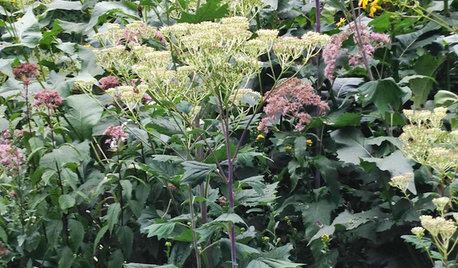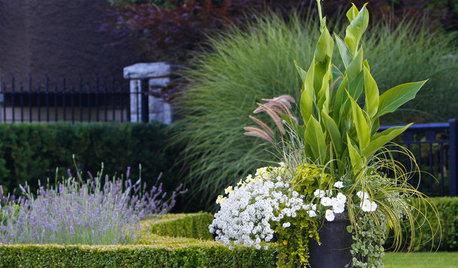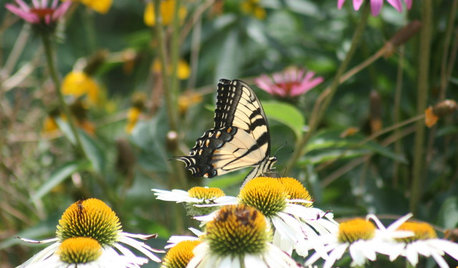Garden Full of Bugs. Overall cure?
sherribaby
17 years ago
Related Stories

CURB APPEALThe Cure for Houzz Envy: Great Front Facade Touches to Borrow
Pull up to a better view and make visitors feel welcome by perking up your home’s face
Full Story
HOUZZ TOURSMy Houzz: Full-Tilt Reinvention for a 1950s Ranch
Out went the dated features of this Vancouver hilltop home, and in went contemporary finishes and clean lines
Full Story
GARDENING GUIDESGreat Design Plant: Knock Out Roses
As glorious as their high-maintenance kin for a fraction of the work, Knock Out roses make even beginners look like garden stars
Full Story
FLOWERSGreat Design Plant: Joe Pye Weed
This unsung beauty tolerates wet soil, provides beautiful late summer blooms and attracts butterflies and hummingbirds
Full Story
INSPIRING GARDENSHouzz TV: Curves and Surprises Transform a Dry Backyard
A landscape architect’s decision to build a detached studio leads to a whole new backyard full of low-water plants and salvaged treasures
Full Story
GARDENING GUIDESGreat Design Plant: Pale Indian Plantain Stands Tall and Proud
Height and generous flower heads earn Arnoglossum atriplicifolium the attention of both human and insect visitors
Full Story
LANDSCAPE DESIGNGreat Design Plant: Retreat to the Shade of Hardy Catalpa
Big foliage and a towering height provide a shady respite in summer, but that's not all hardy catalpa offers dedicated gardeners
Full Story
ORGANIZINGOrganizing Secrets: It’s the Little Things
Get these 8 small areas under control for a major boost in overall tidiness at home
Full Story
GARDENING GUIDESGreat Design Plant: Cannas
Easy to grow and maintain, these showy, colorful plants are perfect for beginning gardeners
Full Story
GARDENING GUIDESLessons in the Rewards of Selfless Gardening
Let go of gardening for your own vision and watch the garden’s own true vision come forth
Full StoryMore Discussions






booberry85
oldroser
Related Professionals
Norfolk Landscape Architects & Landscape Designers · Simpsonville Landscape Architects & Landscape Designers · Wixom Landscape Architects & Landscape Designers · Jackson Landscape Contractors · Cambridge Landscape Contractors · Doctor Phillips Landscape Contractors · Essex Landscape Contractors · Farmington Landscape Contractors · Hayden Landscape Contractors · New Cassel Landscape Contractors · Oviedo Landscape Contractors · Quincy Landscape Contractors · Sun Valley Landscape Contractors · Albany Driveway Installation & Maintenance · Parker Driveway Installation & Maintenanceclickermel
hisgirltoo
gw:bill-inpnw
boxbeast
gw:bill-inpnw
togo3
suze9
byron
boxbeast
digit
rosebush
alphonse
granite
marciaz3 Tropical 3 Northwestern Ontario
boxbeast
laceyvail 6A, WV
granite
marciaz3 Tropical 3 Northwestern Ontario
Violet_Z6
justaguy2
Violet_Z6
Karen Pease
jennijenjen
kubotabx2200
glorygrown
kelleyville
Violet_Z6